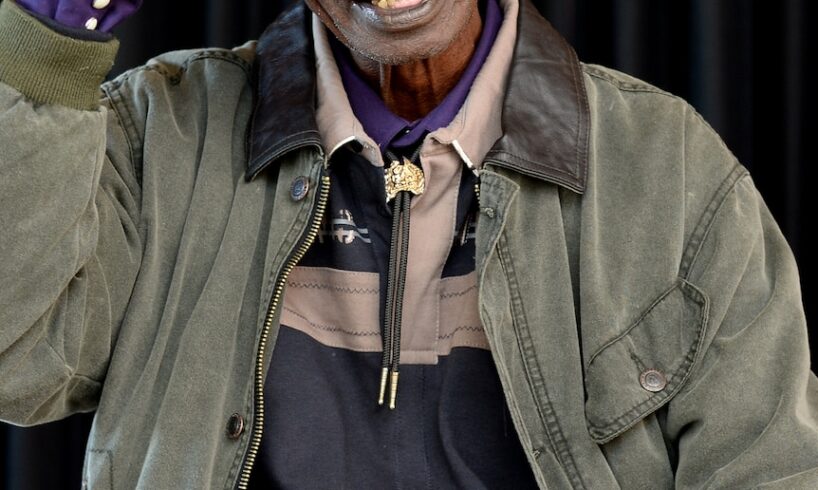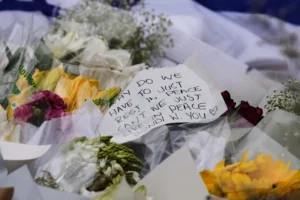
WARNING: Aboriginal and Torres Strait Islander readers are advised this article contains images of a person who has died.
The late actor’s family has granted permission to use his name and image.
As he was dying of lung cancer, legendary Yolŋu actor David Gulpilil set in motion the process of sharing a part of himself the world had never seen.
In his decades-long career, Gulpilil appeared in some of Australia’s biggest films — including Crocodile Dundee, Australia and Rabbit-Proof Fence.
David Gulpilil was a famous Indigenous actor, celebrated as one of the NT’s most well-known film stars.(AAP: Terry Trewin)
But he had also aspired for many years to bring cameras into his tiny homeland of Gupulul, deep in north-east Arnhem Land’s picturesque wetlands.
“No one knows that place, no one knows the people, no one knows the tribes, no one knows the stories, the songs, the dances,” his son, Jida Gulpilil, said.
“And now you’re seeing it for the first time.”
Loading…
The film Journey Home, David Gulpilil fulfils that ambition, documenting the eminent actor’s traditional funeral in Gupulul in 2022.
It screened at Darwin’s Deckchair Cinema on Thursday night, opening the Darwin International Film Festival ahead of its wider cinematic release next month.
People gathered in Darwin for the debut screening of Journey Home, David Gulpilil.(ABC News: Laetitia Lemke)
After Gulpilil died in South Australia in November 2021, director and producer Maggie Miles worked with Yolŋu leader Witiyana Marika to document the late actor’s lengthy funerary rites.
Accompanied by mourning ceremonies at every stage, Gulpilil’s body travelled in a hearse from SA’s Murray Bridge to Darwin, before he was flown to Nhulunbuy in north-east Arnhem Land.
Months later, once the funeral had been arranged, he was buried in Gupulul.
“It was David’s wish to invite the whole world to his funeral and also that the process be documented, so that his lifelong journey of sharing of culture could continue,” Miles said.
Loading…
Bringing his wish to life meant battling through crocodile-inhabited swamplands in motorless tinnies, from the small community of Ramingining into the estate of the Dhalaithŋu clan.
“You get across, you walk for about half an hour with everything that you’ve got … and then you get to David’s old house; there’s one dwelling there,” Miles said.
“There’s no kitchen, no running water, no electricity, no nothing.”
Maggie Miles (right) at the Darwin International Film Festival this week, alongside her fellow co-director Trisha Morton-Thomas.(ABC News: Pete Garnish)
Jida says Gupulul is so remote that the stories and dances performed at David’s funeral and documented in the film are obscure, even to Yolŋu.
“The ceremonies and the culture is not only not seen by the Western world, but it’s unseen by our own people,” he said.
“This is the first time our people are seeing the ceremony.”
Family and friends mourned the loss of David Gulpilil when his body was flown back to his homeland in 2022.(ABC News: Michael Franchi) Mr Gulpilil was buried in Arnhem Land.(ABC News: Michael Franchi)
Co-director Trisha Morton-Thomas said the filming of Gulpilil’s funeral ceremony, or Bäpurru, kept evolving as more people arrived bearing dances connected to Gupulul.
“We would have one lot of people come in with their dances, and so you’re filming that, and then suddenly there’s a commotion going on somewhere else, and it’s another group of people that have come in with their ceremonies,” she said.
“So we just constantly had this coming of people, and it’s just getting bigger and bigger and bigger.”
Jida Gulpilil said the documentary showed the world the stories of Gupulul “for the first time”.(ABC News: Pete Garnish)
Gulpilil’s son said hosting the documentary film crew at Gupulul brought together two different worlds.
“I think it was satisfying to finally have people come to our homeland and see who we really are and where we really come from,” Jida said.
Prior to Journey Home’s screening at Darwin’s Deckchair Cinema this week, the documentary was taken on a screening tour to Yolŋu communities including Ramingining, Gapuwiyak and Yirrkala.
A crowd gathered in Ramingining, watching the Journey Home documentary.(Supplied)
Gulpilil’s niece, Judy Malibirr, said it was important the footage of her uncle’s funeral was shared among his people.
“Men’s ceremony and women’s ceremony [is] how we teach the kids, our children, to learn — they’re seeing and listening to make them strong,” she said.
“And we still keep going.”





